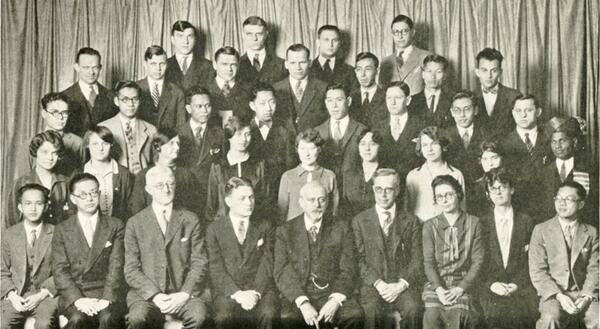As part of Korea Remixed, a campus-wide initiative to celebrate Korean culture, this spring the IU Archives is recognizing the earliest Korean students to become Hoosiers! Via a series of blog posts and an upcoming poster in the Wells Library Lobby, you will get a peek into the lives of four IU alumni from Korea while on the Bloomington campus and the ways they excelled afterwards.
Whether you’re a fan of K-pop, Kimchi, or their extensive skincare routines, there is a lot to love and appreciate about Korean culture. Respecting your elders and authority, caring deeply for family, and working together to advance their nation are all core values in Korea. Even up to recent years, it was not uncommon that younger generations had to leave their family behind in Korea to pursue better educational opportunities in order to create a better life for their family. While many later return to their homeland, some go on to become citizens of the United States and remain here for the rest of their lives. Acknowledging the hardships and perseverance each of the following early IU students from Korean went through in the pursuit of higher education brings a new perspective on the many different paths to excellence.
Eung Tyun Cho (Pyeng Yang, Korea) (PhD in Physics, 1928)
Before coming to the United States, Eung Tyun Cho, born circa 1897, attended a Korean Presbyterian Mission School followed by a Presbyterian Boys’ Academy for his secondary education. As a young adult, he attended Union Christian College where he received his bachelor’s degree. Upon graduation, Cho returned to Mission High School as a math teacher to teach young students much like his younger self, eventually working his way up to become superintendent of the high school. Despite his accomplishments, Cho felt the need to gain more education to better serve his home country, so he chose to leave his family at his father’s home so that he could travel to the United States – and Indiana – in 1922. Once in the Hoosier state, Cho enrolled in Tri-State College in Angola, where he earned a BS in civil engineering before continuing on to Purdue University to earn his MS in physics. (Indianapolis Star, 1928).
Eung Tyun Cho entered Indiana University in 1925 in pursuit of his PhD and a few years later was made a member of Sigma Xi, an honorary science organization (Indianapolis Star, 1928). To support himself financially during his student years, he did housework, mowed lawns, janitorial work, and other odd jobs he could find (1930 Census for Bloomington, Indiana). Cho specialized in research about radio and TV, completing his dissertation on the topic “A study of three-electrode vacuum tube oscillator: conditions for maximum current ”. In addition to his technological research, he published works on language learning, one being Spoken English, a manual for Korean teachers of spoken English and for students who were learning the English language (Indianapolis Star, 1928).

The 1927 Cosmopolitan Club which was largely comprised of international students such as Cho, IU Archives P0109572
After completing his studies at IU, Cho wished to return to Korea in order to be a scientific educator to young students like himself. At the time Cho was one of only 12 men in Korea to have a PhD! Even with his impressive credentials, some Korean authorities frowned upon his work, calling it a “waste of time”, which kept him from his dream of teaching. His research and science experiments lacked funding, so he had to give them up. He remarked, “I am a man without a country” (The Bedford Sunday Star, 1936).
Taking a break from his educational and scientific interests, Cho served three years as chief of police communications during the US Military Government period after Korea was liberated from the Japanese in 1945. He then served eight years in the Korean Army, four as chief signal officer. He later was appointed as vice minister of the Korean Ministry of Communications (The Daily Record, 1954). Before, during, and after his career, Cho participated in church communities as well as the YMCA in America and Korea.
And, finally for a satisfying conclusion. In 1964, Eung Tyun Cho became the new president of Tongkuk Engineering College in Seoul, Korea. After decades of perseverance, he became an educator, while at the same time reuniting permanently with his wife and children (The Indianapolis News, 1964).
**This blog post is the first in a two-part series. The next installment will features three more alumni from Korea. Pongsoon Lee, Chonghan Kim, and Thomas Kunhyuk Kim.
Leave a Reply